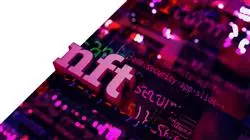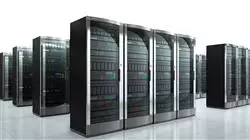University certificate
The world's largest faculty of information technology”
Introduction to the Program
It's not enough to be a good computer scientist, become an expert with this program on Blockchain, DeFi and NFT and stand out from the rest”

The universe of NFTs or Non-Fungible Tokens is enormous, and can encompass practically anything, from works of art, to tweets, photographs, etc. The cryptography of these Tokens is what makes these assets unique, no two are alike and they cannot be exchanged with each other. This same concept can be transferred to the technology sector and, more specifically, to the role of the IT professional.
The figure of the professional must adapt strategically to the current demand, and companies such as Coca-Cola or even FC Barcelona, are already relying on this type of investment. Computer scientists who bet on curricula focused on Blockchain technology, NFT and DeFi are guaranteed a promising professional future as there is a real demand for experts in these digital universes.
For this reason, TECH bets on innovation and offers the opportunity to undertake a new adventure, reaching the challenge of launching the IT career towards the Blockchain, DeFi and NFT field in this University Expert.
This is a unique opportunity to advance and acquire skills in the metaverse. In a flexible way, without schedules or displacements, totally online, because it would be paradoxical to learn the use and development of all virtual spaces in an analogical way. TECH's methodology allows the computer scientist to adapt the syllabus to his or her own pace, assuming the teaching load according to his or her own interests and responsibilities.
Make the right decisions, redirect your profession to the sector that currently offers the best professional opportunities”
This Postgraduate diploma in Blockchain, DeFi and NFT contains the most complete and up-to-date program on the market. The most important features include:
- Case studies presented by experts in cryptocurrencies, Blockchain and video games
- The graphic, schematic, and practical contents with which they are created provide practical information on the disciplines that are essential for professional practice
- Practical exercises where self-assessment can be used to improve learning
- Its special emphasis on innovative methodologies
- Theoretical lessons, questions to the expert, debate forums on controversial topics, and individual reflection assignments
- Content that is accessible from any fixed or portable device with an Internet connection
You will be able to understand the functioning of the NFT mining system from the hand of the best working professionals, who will instruct you on the keys to Yield Farming, tokenization and NFT market studies”
The program’s teaching staff includes professionals from sector who contribute their work experience to this educational program, as well as renowned specialists from leading societies and prestigious universities.
The multimedia content, developed with the latest educational technology, will provide the professional with situated and contextual learning, i.e., a simulated environment that will provide immersive education programmed to learn in real situations.
This program is designed around Problem-Based Learning, whereby the professional must try to solve the different professional practice situations that arise during the academic year For this purpose, the student will be assisted by an innovative interactive video system created by renowned and experienced experts.
Learn how to develop and plan gamified economy projects, the Metaverse is waiting for you"

You will be able to delve into the security of the Blockchain economy, DeFi markets and NFT monetization strategies with an extensive agenda rich in multimedia resources"
Why study at TECH?
TECH is the world’s largest online university. With an impressive catalog of more than 14,000 university programs available in 11 languages, it is positioned as a leader in employability, with a 99% job placement rate. In addition, it relies on an enormous faculty of more than 6,000 professors of the highest international renown.

Study at the world's largest online university and guarantee your professional success. The future starts at TECH”
The world’s best online university according to FORBES
The prestigious Forbes magazine, specialized in business and finance, has highlighted TECH as “the world's best online university” This is what they have recently stated in an article in their digital edition in which they echo the success story of this institution, “thanks to the academic offer it provides, the selection of its teaching staff, and an innovative learning method aimed at educating the professionals of the future”
A revolutionary study method, a cutting-edge faculty and a practical focus: the key to TECH's success.
The most complete study plans on the university scene
TECH offers the most complete study plans on the university scene, with syllabuses that cover fundamental concepts and, at the same time, the main scientific advances in their specific scientific areas. In addition, these programs are continuously being updated to guarantee students the academic vanguard and the most in-demand professional skills. In this way, the university's qualifications provide its graduates with a significant advantage to propel their careers to success.
TECH offers the most comprehensive and intensive study plans on the current university scene.
A world-class teaching staff
TECH's teaching staff is made up of more than 6,000 professors with the highest international recognition. Professors, researchers and top executives of multinational companies, including Isaiah Covington, performance coach of the Boston Celtics; Magda Romanska, principal investigator at Harvard MetaLAB; Ignacio Wistumba, chairman of the department of translational molecular pathology at MD Anderson Cancer Center; and D.W. Pine, creative director of TIME magazine, among others.
Internationally renowned experts, specialized in different branches of Health, Technology, Communication and Business, form part of the TECH faculty.
A unique learning method
TECH is the first university to use Relearning in all its programs. It is the best online learning methodology, accredited with international teaching quality certifications, provided by prestigious educational agencies. In addition, this disruptive educational model is complemented with the “Case Method”, thereby setting up a unique online teaching strategy. Innovative teaching resources are also implemented, including detailed videos, infographics and interactive summaries.
TECH combines Relearning and the Case Method in all its university programs to guarantee excellent theoretical and practical learning, studying whenever and wherever you want.
The world's largest online university
TECH is the world’s largest online university. We are the largest educational institution, with the best and widest online educational catalog, one hundred percent online and covering the vast majority of areas of knowledge. We offer a large selection of our own degrees and accredited online undergraduate and postgraduate degrees. In total, more than 14,000 university degrees, in eleven different languages, make us the largest educational largest in the world.
TECH has the world's most extensive catalog of academic and official programs, available in more than 11 languages.
Google Premier Partner
The American technology giant has awarded TECH the Google Google Premier Partner badge. This award, which is only available to 3% of the world's companies, highlights the efficient, flexible and tailored experience that this university provides to students. The recognition as a Google Premier Partner not only accredits the maximum rigor, performance and investment in TECH's digital infrastructures, but also places this university as one of the world's leading technology companies.
Google has positioned TECH in the top 3% of the world's most important technology companies by awarding it its Google Premier Partner badge.
The official online university of the NBA
TECH is the official online university of the NBA. Thanks to our agreement with the biggest league in basketball, we offer our students exclusive university programs, as well as a wide variety of educational resources focused on the business of the league and other areas of the sports industry. Each program is made up of a uniquely designed syllabus and features exceptional guest hosts: professionals with a distinguished sports background who will offer their expertise on the most relevant topics.
TECH has been selected by the NBA, the world's top basketball league, as its official online university.
The top-rated university by its students
Students have positioned TECH as the world's top-rated university on the main review websites, with a highest rating of 4.9 out of 5, obtained from more than 1,000 reviews. These results consolidate TECH as the benchmark university institution at an international level, reflecting the excellence and positive impact of its educational model.” reflecting the excellence and positive impact of its educational model.”
TECH is the world’s top-rated university by its students.
Leaders in employability
TECH has managed to become the leading university in employability. 99% of its students obtain jobs in the academic field they have studied, within one year of completing any of the university's programs. A similar number achieve immediate career enhancement. All this thanks to a study methodology that bases its effectiveness on the acquisition of practical skills, which are absolutely necessary for professional development.
99% of TECH graduates find a job within a year of completing their studies.
Postgraduate Diploma in Blockchain, DeFi and NFT.
Blockchain, DeFi and NFT are concepts related to cryptocurrency technology and the use of blockchain.
Blockchain: is a distributed ledger technology that enables the creation of secure, decentralized and tamper-resistant digital records. Data is stored in blocks and linked using cryptography. It is primarily used for the registration and transfer of cryptocurrencies such as Bitcoin and Ethereum, but is also being explored for use in other applications such as identity management, product traceability and voting.
DeFi (Decentralized Finance): is a decentralized financial system that uses blockchain and smart contract technology to create a financial infrastructure that is open, transparent and accessible to all. It offers a variety of investment, lending, exchange and insurance options, and aims to decentralize access to financial services and eliminate the need for centralized intermediaries.
NFT (Non Fungible Tokens): are unique, indivisible tokens that are registered on a blockchain. Unlike fungible tokens (such as cryptocurrencies), which are exchangeable, each NFT is unique and used to represent unique digital assets, such as artwork, collectibles, games and other digital objects.
In terms of application, blockchain is used in most cryptocurrencies as a secure and decentralized means of transferring value. DeFi is applied in the creation of new decentralized financial products that eliminate the need for trusted intermediaries, offering more freedom and transparency in managing your finances. NFTs have been used in areas such as digital art, gaming and collectibles, enabling authentication and identification of unique assets.
Overall, these technologies are constantly evolving and applications are increasingly being explored in other areas, such as product traceability, supply chain management and online voting.







